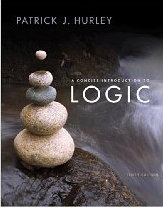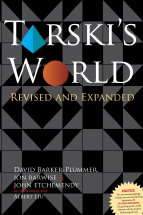
Dr Tom Kerns
Introduction to Logic
PHIL 106
Course Requirements
These are some of the things you will need to do if this course is to be a meaningful one for you:
Required books:

Patrick Hurley,
A Concise Introduction to Logic, Tenth edition, with iLrn Access Code
(It is essential that you have the 10th edition)
Thomson/Wadsworth, 2008
ISBN-13: 978-0495800187
You will unfortunately need to purchase a new copy of this book. Used books will not include a functioning iLrn Access Code, and that code will be absolutely necessary for accessing the online teaching materials, assignment exercises, quizzes and exams associated with this course. It will not be possible to participate in this online course without a functioning iLrn Access Code.

Dave Barker-Plummer, Jon Barwise & John Etchemendy,
Tarski's World: Revised and Expanded, with CD enclosed,
CSLI Publications, distributed by University of Chicago Press, 2008
ISBN-13: 978-1575864846
You will unfortunately need to purchase a new copy of this book as well. Otherwise the Registration number on the enclosed CD will not work and you would not be able to submit the required exercises online.
Required writing includes:
- logging in to iLrn and completing and submitting exercises for each assigned chapter
- active participation in all your homegroup's activities
- active and full participation in all online discussions of the issues raised in class
- completion of two Self Evaluations of your work in the course, one at midterm and one due on the last day of the quarter
General expectations
- Regular and substantial (5-7 days per week) participation in all online discussions
- Active participation in your homegroup
- Completion of all online exercises and assignments -- several to be turned in each week
- Reading the assigned materials
- Coursework will probably require about twenty hours per week of your time, perhaps more, and will require logging into the classroom pretty much every day. Five to six days per week would be a minimum.
Approximate weekly schedule
- Our weeks this quarter will begin on Thursday mornings and end on the following Wednesday evening at 8pm
- Each week, as a rule, there will be several different assignment deadlines
Methods and materials for evaluation
- Grading, to put it simply, is based entirely on your work and achievement in the course. This includes items such as
- Full participation in online discussions and in your homegroup
- Completion of all online exercises and assignments
- Writing and posting complete answers to book study questions
- Examinations (midterm and final) and quizzes
- Personal engagement and participation in the study
- A large part of my assigning your grade relies on information you provide me in your self-evaluation for the course. See the Self Evaluations homepage for details.
Exams
- We will have a mid-term exam and a final exam, each exam covering approximately half of the course.
- Several shorter quizzes on smaller sections of class material
- Make-ups on exams or quizzes will not be allowed (except in special circumstances and only if you make formal arrangements with me before the exam or quiz is given)
- (Here is a copy of the final finaler finalest exam that all students will be required to pass before being granted their degree -- well, maybe...)
Miscellaneous
- We will be using the Angel classroom software as our online classroom. Once you are registered for the course you will receive instructions for logging into our Angel classroom.
- Fall quarter begins on Monday September 28, 2009
- Last date to register: Monday September 28, 2009 (if seats are still available)
Nota Bene
- Studies show that most students who fail (or do not complete) online courses do so because they do not form the habit early on of logging in to the classroom every day. If you miss more than a day or two you can easily fall behind in the course; it then becomes very difficult to catch up.
- The American philosopher William James has a beautiful and famous chapter "On Habit", and how the formation of useful habits can work for our benefit, in his book, The Principles of Psychology. He also has a nice essay on "The Laws of Habit" in a book titled Talks for Teachers. (These are not assigned readings, but you may well find them meaningful.)
I hope that, besides the work you do for a good evaluation in this course, your work will also pay off in making the course enjoyable (though perhaps difficult), and highly meaningful for you.
HOMEPAGE | REQUIREMENTS | ASSIGNMENTS | TARSKI'S WORLD | SELF EVALUATIONS
ABOUT LOGIC | BUSINESS STUFF | ANGEL LOGIN | iLrn LOGIN
![]() 2010-2011 Dr Tom Kerns
2010-2011 Dr Tom Kerns
This Introduction to Logic course is licensed under a Creative Commons Attribution-NonCommercial-NoDerivs 3.0 Unported License. Permissions beyond the scope of this license may be available here. Open educational resources produced by other individuals or organizations that are embedded in these course materials
may be licensed under a different open license. Please confirm the license status of these third-party resources before reusing them.
© 2009 Dr. Tom Kerns Site by Gray’s Web Design